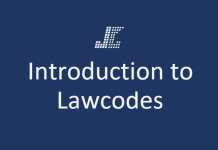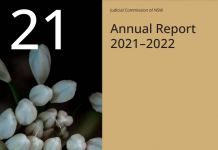Update 55, August 2023
Update 55 amends the Bench Book to update and revise with recent case law and legislative developments the following chapters:
Purposes of sentencing
- [2-240] To prevent crime by deterring the offender and other persons from committing similar offences: s 3A(b) has been revised in relation to R v Mauger [2012] NSWCCA 51.
Conditional release orders (CROs)
- [4-720] Procedures for making a CRO has been revised in relation to R v Mauger [2012] NSWCCA 51.
Dismissal of charges and conditional discharge
Setting terms of imprisonment
- [7-516] Giving effect to finding of special circumstances to add reference to Harris v R [2023] NSWCCA 44 regarding the application of s 44(2) Crimes (Sentencing Procedure) Act 1999 where a sentence is accumulated on an existing sentence.
- [7-600] Exclusions from Division to update the reference to the Mental Health and Cognitive Impairment Forensic Provisions Act 2020.
Standard non-parole period offences — Pt 4 Div 1A
- [7-890]ff What is the standard non-parole period? has been updated and substantially revised, with references added to the following cases:
- Tepania v R [2018] NSWCCA 247 regarding the consideration of the standard non-parole period in sentencing.
- AC v R [2023] NSWCCA 133, GL v R [2022] NSWCCA 202 and Smith v R [2022] NSWCCA 88 regarding exclusions and inclusions from Pt 4 Div 1A.
Objective and subjective factors at common law
- [9-710] The difficulty of compartmentalising sentencing considerations to add reference to R v Eaton [2023] NSWCCA 125 regarding the term “moral culpability” as used in R v Whyte (2002) 55 NSWLR 252.
- [9-720] The aggravating/mitigating binary fallacy to add reference to Gibbons (a pseudonym) v R [2019] NSWCCA 150 and R v LS [2020] NSWCCA 148 regarding the impact of the absence of factors elevating the seriousness of the offence.
Objective factors at common law
- [10-000]ff Maximum penalty has been updated and substantially revised, with references to the following cases added:
- FL v R [2020] NSWCCA 114 regarding assessing the objective seriousness of an offence.
- Camilleri v R [2023] NSWCCA 106, Tepania v R [2018] NSWCCA 247, Paterson v R [2021] NSWCCA 273 and Lawrence v R [2023] NSWCCA 110 regarding mental health or cognitive impairment and objective seriousness.
- Kochai v R [2023] NSWCCA 116 and R v Eaton [2023] NSWCCA 125 regarding objective seriousness findings.
- R v Boyd [2022] NSWCCA 120, Tatur v R [2020] NSWCCA 255 and Paterson v R [2021] NSWCCA 273 regarding the use of sentencing statistics and Sharma v R [2022] NSWCCA 190 regarding aggregate sentences and the use of sentencing statistics.
Subjective matters at common law
- [10-400]ff Assessing an offender’s moral culpability has been updated and substantially revised, with references added to the following cases:
- Tepania v R [2018] NSWCCA 247 and Paterson v R [2021] NSWCCA 273 regarding assessing an offender’s moral culpability.
- Richards v R [2023] NSWCCA 107 regarding sentencing where there is a gap in an offender’s criminal history.
- Bhatia v R [2023] NSWCCA 12 regarding an offender’s good character and the application of s 21A(5A) Crimes (Sentencing Procedure) Act.
- Lawrence v R [2023] NSWCCA 110 regarding where an offender’s mental condition may be relevant to the objective seriousness of an offence.
- DR v R [2022] NSWCCA 151, Hoskins v R [2021] NSWCCA 169, R v Irwin [2019] NSWCCA 133, Judge v R [2018] NSWCCA 203, Ohanian v R [2017] NSWCCA 268, Nasrallah v R [2021] NSWCCA 207, Perkins v R [2018] NSWCCA 62 and Donovan v R [2021] NSWCCA 323 regarding an offender’s deprived background and specific applications of the principles in Bugmy v The Queen (2013) 249 CLR 571.
Parity
- [10-800] Summary of relevant considerations has been updated in relation to when co-offenders are sentenced by different judges.
- [10-801] Introduction to add reference to R v Rosenberg [2022] NSWCCA 295 and R v Dyson [2023] NSWCCA 132 regarding when co-offenders are sentenced by different judges on the basis of different facts.
- [10-807] Co-offenders with joint criminal liability to add new commentary regarding relative culpability of co-offenders by reference to their conduct in the joint criminal enterprise.
Power to reduce penalties for assistance to authorities
- [12-215] Broad scope of s 23(1) to add reference to Vaiusu v R [2022] NSWCCA 283 regarding what constitutes an undertaking to assist for the purposes of s 23 Crimes (Sentencing Procedure) Act 1999.
Children (Criminal Proceedings) Act 1987
- [15-070] A court may direct imprisonment to be served as a juvenile offender to update the reference to the Mental Health and Cognitive Impairment Forensic Provisions Act 2020.
Sexual offences against children
- [17-570] Mitigating factors to add reference to Richards v R [2023] NSWCCA 107 regarding where there is a delay in complaint in child sexual assault matters.
Dangerous driving and navigation
- [18-300]ff Statutory history to add reference to R v Eaton [2023] NSWCCA 125 regarding the impact of changes in sentencing practice since the sentencing guideline set out in R v Whyte (2002) 55 NSWLR 252.
- [18-430] Application of the guideline to dangerous navigation to add reference to R v Eaton [2023] NSWCCA 125 regarding the relevance of the sentencing guideline set out in R v Whyte (2002) 55 NSWLR 252 to dangerous navigation involving a kayak.
Detain for advantage/kidnapping
- [18-730] Joint criminal enterprise and role to add reference to Rahman v R [2023] NSWCCA 148 regarding taking into account injuries occasioned during offending involving a joint criminal enterprise.
Sexual assault
- [20-740] Bestiality to add reference to Chesworth v R [2023] NSWCCA 115 regarding the objective seriousness of bestiality offences.
Domestic violence offences
- [63-510] Sentencing approach to domestic violence to add reference to Kennedy v R [2022] NSWCCA 215 regarding the treatment of domestic violence victims and the moral culpability of offenders with deprived backgrounds.










